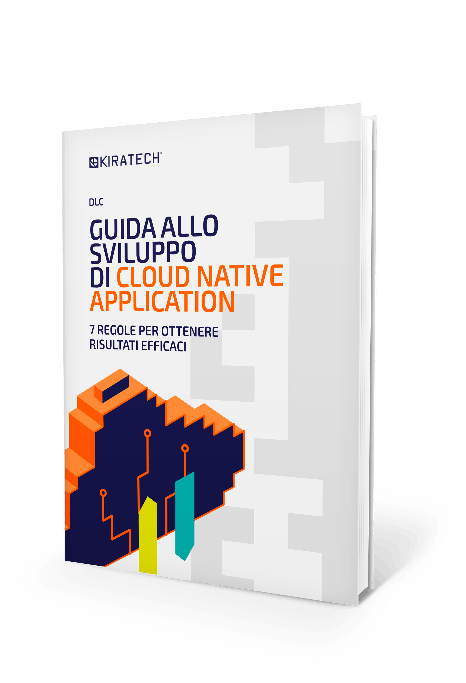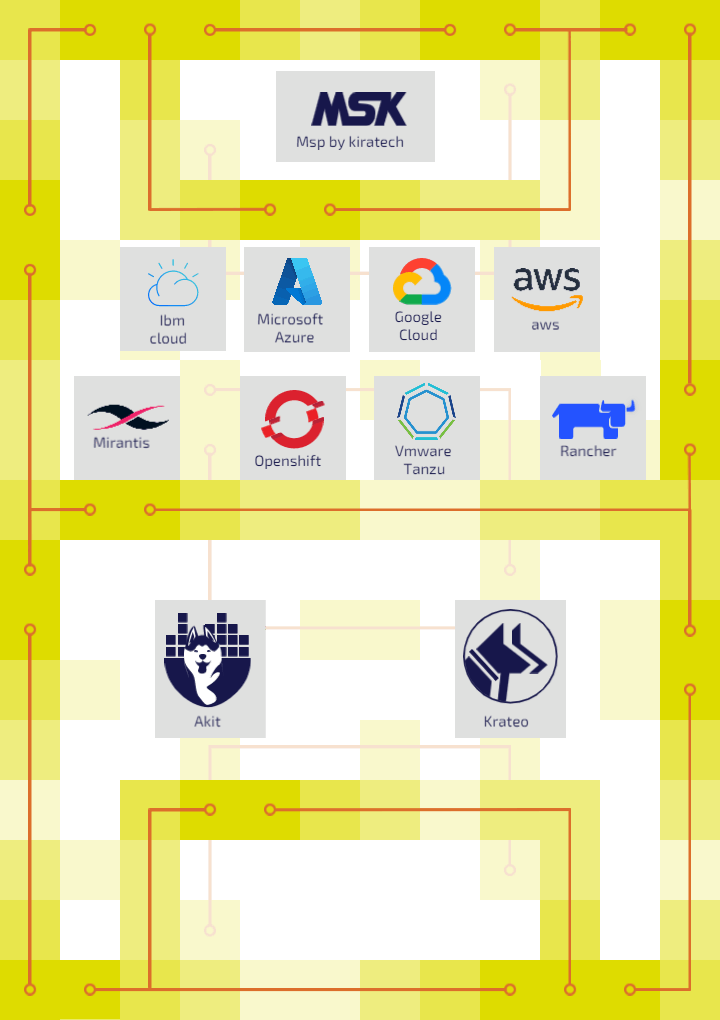PLATFORM ENGINEERING & KUBERNETES
Platform Engineering - the evolution of DevOps methodology to simplify your toolchain
Kubernetes - your open-souce platform for managing containerised workload


How much is devops used
in your agency?
Find out with the DevOps Maturity Assessment.
Scale your DevOps initiatives with Platform Engineering
Platform Engineering is the evolution of the DevOps methodology, which aims to improve synergies between Developer Teams (Dev) and Operations Teams (Ops) in order to speed up the realisation of software and render the relative processes more efficient.
The DevOps method can be adopted in Enterprise contexts projected towards the Digital Transformation and offers several advantages:
- Reduce the Time to Market and application release time. DevOps services, applications and processes faster;
- Improves collaboration between teams. Increases productivity and speed throughout the organisation;
- Improves software quality. Quality Gate, Security Gate, Test Automation;
- Develops Modern Multi-Cloud Application Architectures to modernise your application environment;
- Continuous Observability with logs, metrics, events, APM, security;
- Standardisation of testing, development and application release processes to simplify internal processes
Our DevOps partners
Kiratech was among the forerunners of the DevOps vision in Italy. Our successful partnerships prove it. Thanks to them we provide you with the best tools to implement the DevOps methodology and move to Platform Engineering.



Kubernetes




Kubernetes is a portable, extensible, open-source platform for managing containerised services and workloads that allows any type of application to run in a variety environments.
.svg)
Discover Kubernetes

Kubernetes Services
DevOps Methodology
Guidelines
First and foremost, DevOps is a team sport. Implementing it requires a shared "corporate culture", specific practices to be followed and the use of dedicated tools, namely:
- Observability. Flexibly analyse and monitor your application architecture through logs, metrics and tracking;
- Application modernisation. Extend the value of your legacy infrastructure investment throught the most innovative solution;
- Application Lifecycle Management. CI/CD, Git, Test Automation, Release Orchestration
- GitOps. Automatically manage the installation and deplyment of the infrastructure and application architecture whilist maintaining a complete overview of the system's condition and modifications;
- Develop automation via Containers, Microservices and Kubernetes . Microservices and Kubernetes Creation of isolated, secure, portable development environments and Service Mesh.
Free downloadable content
The best tools for DevOps
Discover all the tools to use to implement DevOps methodology to your business.
DevOps and Cloud Native
Enterprise
The DevOps methodology is fundamental for the implementation fo a Cloud Native approach.
Being Cloud Native means adopting technologies and techniques to create resilient and monitorable systems, with the goal of developing and deploying quality applications with shorter software life cycles driven by user feedback.
Free downloadable content
Cloud Native Approach
Download the Cloud Native guide and take your business to the next level.

Ready to play?
Here's how we can help you!
The DevOps methodology is fundamental for the implementation fo a Cloud Native approach.
Being Cloud Native means adopting technologies and techniques to create resilient and monitorable systems, with the goal of developing and deploying quality applications with shorter software life cycles driven by user feedback.




FAQ
I didn’t implement a DevOps methodology yet. Where should I begin?
You should start your path with a Workshop DevOps for Business, that will allow you to introduce in your company a DevOps Vision and to understand the best tools and practices that you should deploy.
The workshop talks about the DevOps methodology and vision, as well as its benefits that allow you to achieve the best results in your business.
Furthermore, we will talk about the practices underlying DevOps, about DevOps Workflow and about the best tools for a perfect DevOps Design.
I already adopted the DevOps methodology, but I’d like to improve the strategy and to adopt the right tools. How can I do it?
Perform a DevOps Check-up: it consists in a specific advice done by our DevOps specialists that will determine precisely the state of your company in the field of DevOps technologies and procedures.
The check-up is preparatory to the second phase (optional) where we define a DevOps strategy, where our experts will draw up a document of company strategy towards the adoptions of the best tools and DevOps practices.
If I don’t make the DevOps status evaluation of my company, what are the implications?
If you don't do an assessment of your current status with an expert, you'll never know if you're making the right investments in technology and digital choices.
A consultation will allow you to understand if you are making mistakes or if there are inefficiencies in your development process.
You can also define specific goals and, based on these, set the best strategy.
Someone proposed me to make the DevOps status evaluation for free. Will it be reliable?
Many large companies offer those kind of services for free because they are already included in another service that you are going to purchase, or, in other cases, because they don't give much importance to this crucial process.
Which is, in fact, necessary: from the assessment (or check-uo), we are able to create the document where we suggest improvements, action plan and delivery times.
Based on this document, your company is going to plan al the further activities.
An high level evaluation is a great and essential starting point to draw a strategic planning which is going to help your company achieving its goals.
I’m not managing operations internally. Why should I implement the DevOps methodology?
DevOps methodology connects devoper's team with operations team in order to speed up dev processes by using an high quality software.
Operation outsourcing is a paradox: it tightens up development process and slows down code releases. which is the opposite that we are aiming.
There's no collaboration and the process of application development is more rigid.
You should change you corporate culture.
Review your corporate culture, CONTACT US FOR A CONSULTATION >>
I don’t have internal developers. Why should I implement the DevOps methodology?
Usually people think that outsourcing means flexibility and free management, but it is not often like this.
The most competitive and innovative companies in the market have learned to work work with both internal and external developers to gain advantages from the shared work between dev and operations.
This is the purpose of DevOps, that aims to speed up the developing process by depolying an high quality software.
Review your corporate culture, CONTACT US FOR A CONSULTATION>>
Is it important to measure the internal DevOps performances? Are there any benchmark metrics?
For a successful DevOps strategy, identifying and measuring the right KPIs it is fundamental.
Being able to monitor these indicators and identify possible issues can make the difference if you want to stay ahead of the competition and begin an organizational development.
Based on our experience, here are some important KPIs that you might want to monitor to evaluate the performance of DevOps:
- Frequency of code distribution of your Dev team
- Throughput speed from code commit to deployment
We have deepened this aspect in a specific Blog Post, if you want to discover other very important metrics, READ THE ARTICLE

